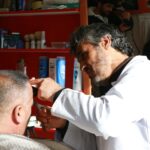In a significant development for Canadian immigration, Quebec has once again demonstrated its strategic approach to selecting skilled workers. The latest draw from the Arrima pool specifically targets individuals with experience in regulated professions, signaling a clear demand for specialized talent within the province. This move not-only addresses critical labour market needs but also provides a distinct pathway for qualified professionals seeking to build a future in La Belle Province. This detailed analysis explores the specifics of this pivotal draw, the importance of regulated professions, and the essential steps candidates must take to navigate Quebec’s unique immigration system successfully.
Table of Contents
- A Comprehensive Breakdown of the September 2025 Quebec Skilled Worker Draw
- The Strategic Importance of Regulated Professions for Quebec’s Economy
- Mastering the Arrima Portal and Quebec’s Points System for Success
- The Indispensable Role of French Proficiency in Quebec Immigration
- Frequently Asked Questions (FAQ)
A Comprehensive Breakdown of the September 2025 Quebec Skilled Worker Draw
On September 25, 2025, the Ministère de l’Immigration, de la Francisation et de l’Intégration (MIFI) conducted a targeted draw through its Quebec Skilled Worker Program (QSWP), also known as the Programme régulier des travailleurs qualifiés (PSTQ). In this round, a total of 1,220 invitations were issued to candidates who had registered an Expression of Interest (EOI) in the Arrima portal. The defining characteristic of this draw was its exclusive focus on candidates with work experience in specific regulated professions. To be considered, candidates needed to achieve a minimum score of 615 points on Quebec’s comprehensive points grid. Furthermore, this draw prioritized candidates who demonstrated an advanced proficiency in the French language, corresponding to a level 7 or higher on the Échelle québécoise des niveaux de compétence en français des personnes immigrantes adultes. This targeted approach underscores Quebec’s commitment to selecting immigrants who can quickly integrate into the workforce and contribute to sectors facing significant labour shortages. Unlike the federal Express Entry system, which often conducts broader, all-program draws, Quebec frequently utilizes its autonomy to pinpoint candidates with the exact skills and qualifications needed to bolster its provincial economy.
The Strategic Importance of Regulated Professions for Quebec’s Economy
Targeting candidates in regulated professions is a deliberate and calculated strategy by the Quebec government. A regulated profession is one that requires a license, certification, or registration with a specific professional order or regulatory body to practice. Examples include nurses, engineers, architects, accountants, and teachers. By inviting individuals from these fields, Quebec aims to fill immediate and projected gaps in essential services like healthcare, education, and engineering. The province recognizes that these roles are fundamental to its societal well-being and economic growth. The immigration process for these professionals is often more complex, as they must navigate the requirements of both MIFI and their respective professional orders. This draw serves as a crucial signal to these bodies and to potential immigrants that the government is actively facilitating their arrival. For prospective immigrants, having experience in a regulated profession can be a powerful asset. It demonstrates a high level of expertise and a commitment to professional standards that Quebec values highly. This focus also helps ensure that newcomers are not just filling any job, but are integrating into high-skilled positions that offer long-term stability and career progression, which ultimately leads to more successful and permanent settlement in the province.
Mastering the Arrima Portal and Quebec’s Points System for Success
The Arrima portal is the cornerstone of Quebec’s skilled worker immigration system. It operates on an Expression of Interest (EOI) model, where candidates first submit a profile detailing their qualifications without an initial application fee. These profiles are then entered into a pool and ranked based on a detailed points system. MIFI periodically invites the highest-ranking candidates to apply for a Quebec Selection Certificate (CSQ). Understanding the factors that contribute to a high score is paramount for any aspiring immigrant. Quebec’s points grid assesses a wide range of human capital and integration factors, designed to predict a candidate’s potential for successful economic establishment. Unlike the federal CRS score, Quebec’s system places an immense emphasis on factors that are directly relevant to the province’s unique cultural and economic landscape. Successfully navigating this system requires a proactive approach, ensuring that every possible point is claimed and properly documented before an invitation is issued. The September 2025 draw, with its minimum score of 615, illustrates the competitive nature of the program and the need for a strong profile.
Key Factors in the Quebec Skilled Worker Points System:
- French Language Proficiency: This is arguably the most critical factor. Advanced French skills can award a significant number of points and are often a prerequisite in targeted draws.
- Education and Area of Training: Points are awarded not only for the level of education but also for the specific field of study, with higher points given to areas in high demand in Quebec.
- Work Experience: Relevant, full-time work experience is crucial. Experience gained in a high-demand occupation or within Quebec itself can provide a substantial boost.
- Age: Candidates typically in their late 20s to early 30s receive the maximum points for age.
- Validated Job Offer: Having a validated job offer, especially one located outside the Montreal Metropolitan Area (CMM), can significantly increase a candidate’s score and chances of selection.
- Spouse/Partner’s Characteristics: The education level, area of training, and French proficiency of a spouse or common-law partner can also contribute valuable points to the primary applicant’s total score.
The Indispensable Role of French Proficiency in Quebec Immigration
It is impossible to overstate the importance of French language skills for anyone considering immigration to Quebec. As the province’s sole official language, French is central to daily life, culture, and the workplace. The Quebec government’s immigration policies reflect this reality, heavily prioritizing candidates who can demonstrate a strong command of the language. In the context of the PSTQ and the Arrima portal, French proficiency is not just an asset; it is often a necessity. The points awarded for French are substantially higher than those for English, and as seen in the recent draw, a minimum proficiency level can be an explicit requirement for an invitation. Achieving a level 7 (B2) or higher in speaking and listening is the gold standard that most successful candidates strive for. This level indicates an ability to communicate effectively and spontaneously in most professional and social situations. For applicants, this means that preparing for and excelling in a standardized French test, such as the TEF Canada or TCF Québec, should be a top priority. Investing time and resources into language training is one of the most effective ways to improve an Arrima score and significantly increase the likelihood of being selected for a CSQ.
Frequently Asked Questions (FAQ)
What is the Quebec Skilled Worker Program (PSTQ)?
The Quebec Skilled Worker Program, or PSTQ, is an immigration pathway for skilled workers who wish to become permanent residents in the province of Quebec. It uses a points-based system to assess candidates based on factors like age, education, work experience, and language skills, with a strong emphasis on French proficiency.
How does the Arrima portal work?
Arrima is an online portal where individuals can submit an Expression of Interest (EOI) to immigrate to Quebec as a skilled worker. Candidates create a profile, which is then entered into a pool and scored. The Quebec government periodically invites the highest-scoring candidates from this pool to apply for a Quebec Selection Certificate (CSQ).
What is a regulated profession in Quebec?
A regulated profession is an occupation that requires a special license, certification, or registration with a professional regulatory body to legally practice in Quebec. Examples of these professions include nurses, engineers, architects, and teachers, which are often targeted in immigration draws to fill critical labour market needs.
Why is French language proficiency so important for Quebec immigration?
French is the official language of Quebec and is essential for social and economic integration. Consequently, Quebec’s immigration system heavily rewards candidates with strong French skills, awarding them significant points in the Arrima system and often making advanced proficiency a mandatory criterion for selection in targeted draws.
Talk to us to find out more. ->
The content above is not intended to provide legal advice or opinions of any kind and may not be used for professional or commercial purposes.







